Boosting Butterfly Numbers in Helliwell
By Chris Junck, Taylor’s Checkerspot Butterfly Recovery Project Team
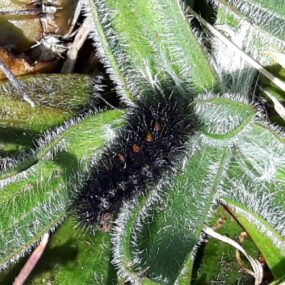
Taylor’s checkerspot butterfly caterpillar. All photos by Chris Junck unless otherwise noted.
The number of Taylor’s checkerspot butterflies (a critically endangered species) in Helliwell Provincial Park rose significantly in March. Nearly 1,300 caterpillars reared at the Greater Vancouver Zoo by Wildlife Preservation Canada staff were gently placed in the park by the Taylor’s Checkerspot Butterfly Recovery Project Team. This follows the first release of almost 800 Taylor’s checkerspot larvae in Helliwell’s coastal bluff meadow last year.
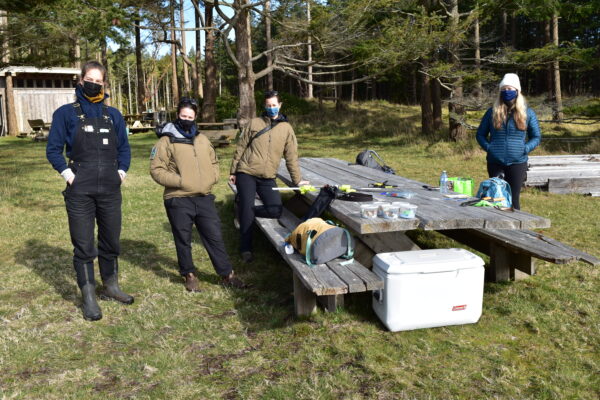
L to R: Michelle Polley, Heather Steere, Erica McClaren, Jennifer Heron.
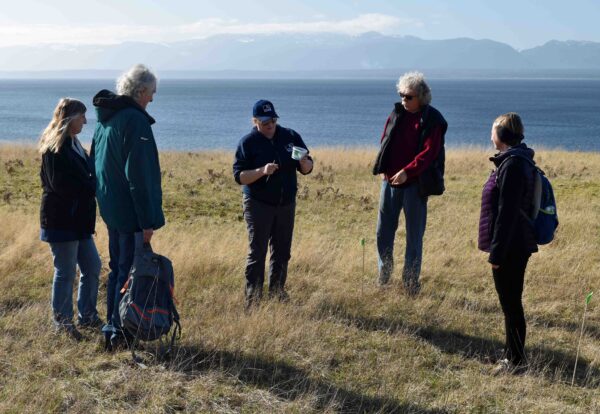
L to R: Norma and Neil Wilson, Andrea Gielens, Bill Hamilton, Diane Proc.
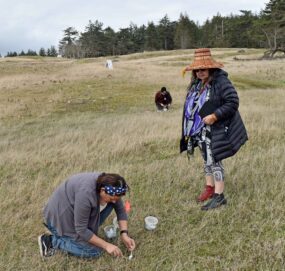
L to R: K’ómoks First Nation Chief Nicole Rempel, Councillor Katherine Frank and Elder Donna Mitchell.
Neil and Norma Wilson, Bill Hamilton and Diane Proc of the Hornby Island Natural History Centre, and K’ómoks First Nation Chief Nicole Rempel, Councillor Katherine Frank, and Elder Donna Mitchell assisted with larval releases this year. “The K’ómoks First Nation is proud to work along-side BC Parks in its endeavors to re-establish the Taylor’s Checkerspot butterfly within our territory. As stewards of the lands and resources within our territory, we view projects such as this as critical to the well-being of our lands, and the ecosystems within it”, said Chief Rempel.
Many of the caterpillars immediately began searching for their favourite foods, such as the leaves of English plantain, blue-eyed Mary, or harsh paintbrush. To survive, they need to find enough nutritious plants to eat and avoid predators, parasites, severe weather and trampling. If all goes well, they will progress through a few more developmental stages, pupate, and then emerge as stunning orange, black and white checkered butterflies in late April to mid-May. Hopefully, several adults will find mates and produce eggs to keep the lifecycle going, but more releases of captive reared caterpillars may be required to firmly re-establish the Taylor’s checkerspot butterfly population on Hornby Island.
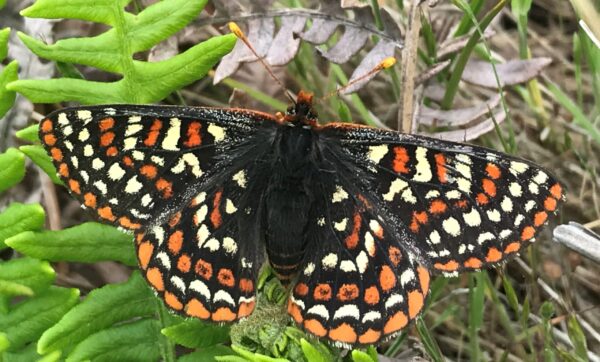
One of the first Taylor’s Checkerspot butterflies observed in Helliwell Provincial Park since the 1990s! Photo by J. Heron.
The next few weeks will be a crucial time for butterflies. Trampling is a key threat for caterpillars and their food plants. “We have invested a lot of time and funding in this project, so we are asking Helliwell’s visitors to please stay on the trails that are delineated by ropes and restoration area signs and keep your dogs on leashes,” said Jennifer Heron, Chair of the Taylor’s Checkerspot Butterfly Recovery Project Team and invertebrate conservation specialist for the B.C. Ministry of Environment and Climate Change Strategy.
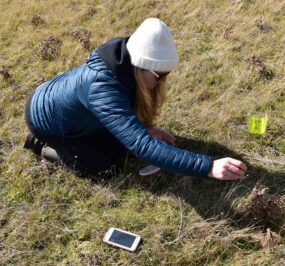
Jennifer Heron carefully places a flag to mark a caterpillar release site.
Visitors are reminded that dogs must be on a leash according to provincial park regulations and bikes aren’t allowed in the park. Also, please do not move or pick up Taylor’s checkerspots. Instead, report sightings to Taylors.Checkerspot@gov.bc.ca, or by using the free iNaturalist app (www.inaturalist.org). It’s an easy to use species identification tool that enables citizen scientists to record and contribute important species data for projects around the globe.
The recovery initiative required extensive habitat restoration in the park, such as selective tree and invasive plant removal, and adding native plants and seeds. Although focused on Taylor’s checkerspot, several other at-risk and uncommon coastal bluff ecosystem species benefit from this project, such as dun skipper butterflies and about a dozen other range-restricted butterflies, western bumble bee, bats, western screech-owl, and numerous other birds and plants.
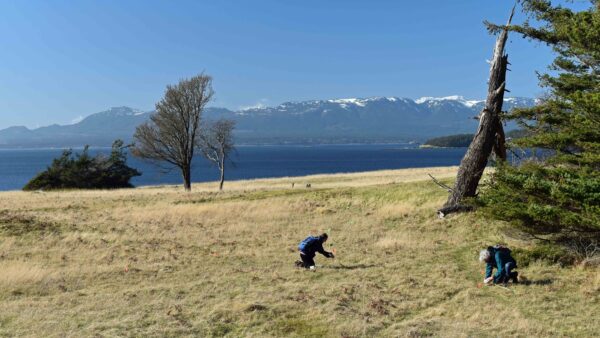
Extensive habitat restoration was required prior to the caterpillar release.
The Taylor’s Checkerspot Butterfly Recovery Project Team includes representatives from BC Ministry of Environment and Climate Change Strategy, BC Parks, biological consultants, Denman Conservancy Association, Garry Oak Ecosystems Recovery Team, Greater Vancouver Zoo, Mosaic Forests, Wildlife Preservation Canada, and others. There has also been a lot of local assistance for the project from Helliwell Park neighbours in High Salal Ranch Strata, volunteers, Conservancy Hornby Island, the Hornby Island Natural History Centre, and Hornby Island Provincial Parks Committee.
The recovery project has benefited from funding and in-kind contributions from the Habitat Conservation Trust Foundation, the BC Parks License Plate Program, the Environment Canada Habitat Stewardship Fund and others.